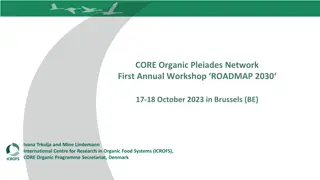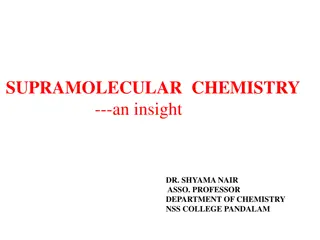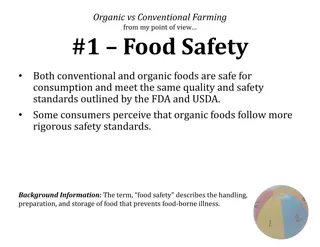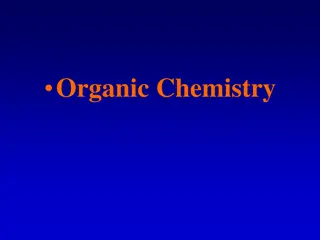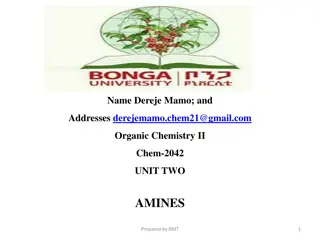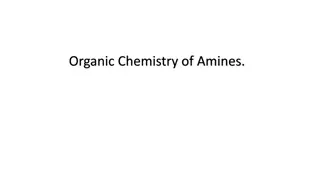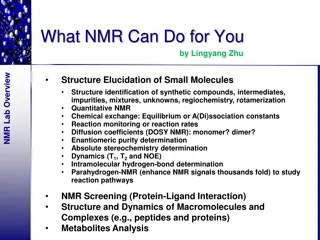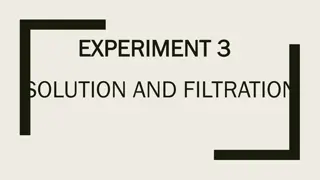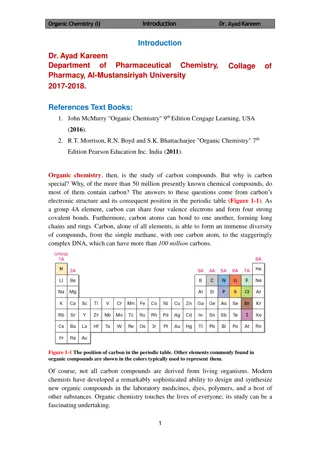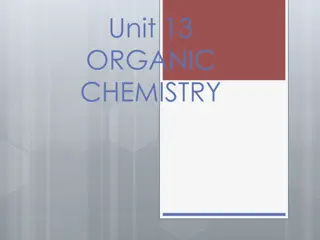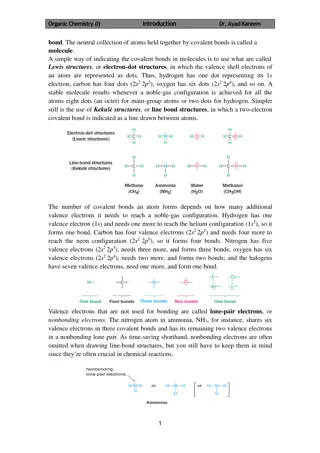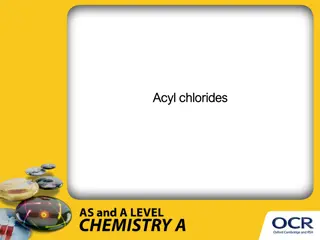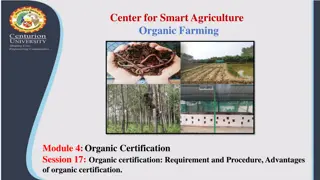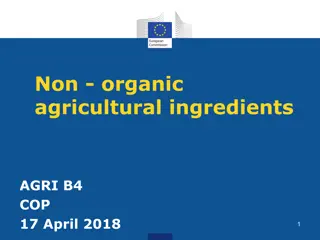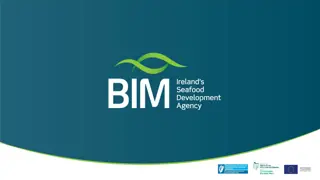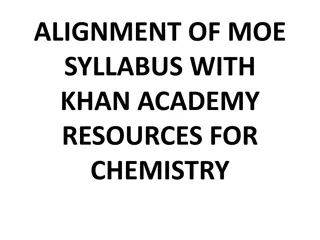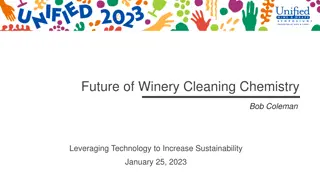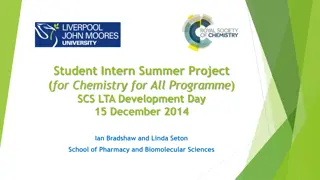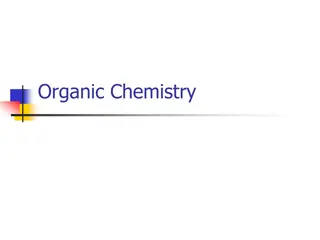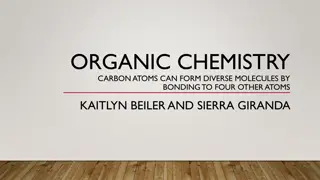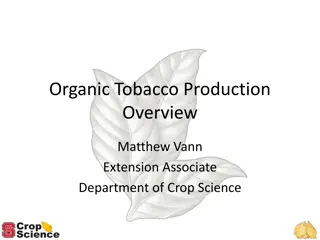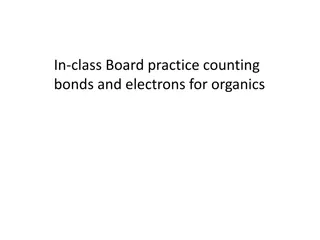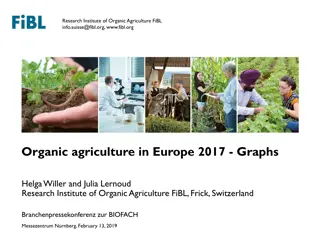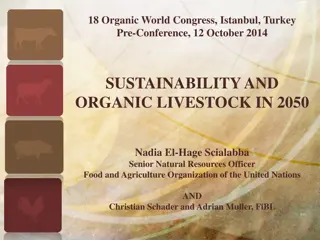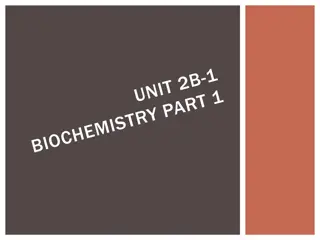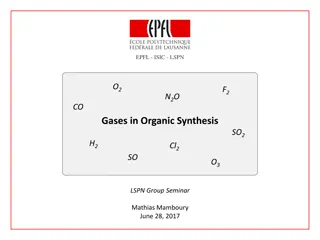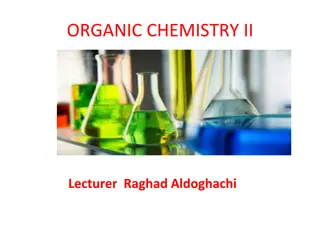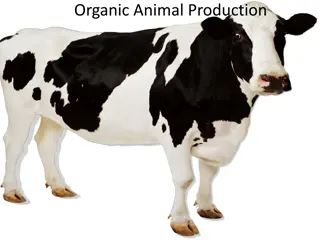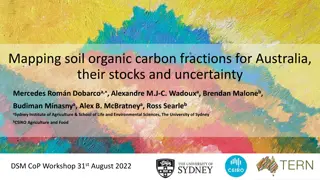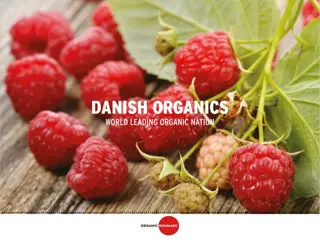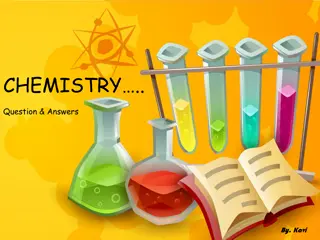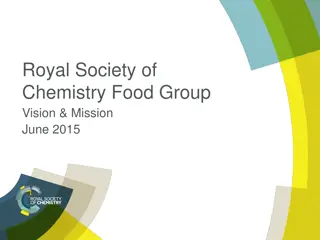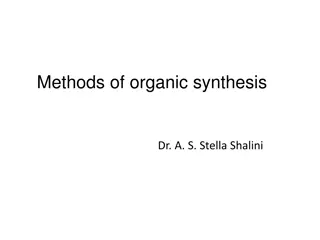Organometallic Chemistry (CHEM 42 1)
Organometallic chemistry delves into compounds with carbon-metal bonds, merging concepts from inorganic and organic chemistry. The field encompasses diverse compounds like ferrocene and tris(triphenylphosphine)rhodium carbonyl hydride, with nomenclature based on naming organic groups and adding meta
1 views • 13 slides
CORE Organic Pleiades Network First Annual Workshop Roadmap 2030 - Event Recap
The CORE Organic Pleiades Network held its first annual workshop in Brussels, focusing on organic research and innovation in the European agri-food sector. The event discussed HEU partnerships, national/regional action plans, research funding, and more. CORE Organic aims to enhance knowledge and inn
0 views • 37 slides
Understanding the Diels-Alder Reaction in Practical Organic Chemistry
The Diels-Alder reaction is a fundamental method in organic chemistry for producing cyclic organic compounds by combining a conjugated diene with an alkene. This reaction, named after Otto Diels and Kurt Alder, involves the formation of a six-membered ring with specific bond rearrangements. Conjugat
4 views • 15 slides
Exploring Supramolecular Chemistry: Insights and Applications
Supramolecular chemistry delves into the chemistry of molecular assemblies, intermolecular bonds, and non-covalent interactions, leading to the formation of supra-molecules through aggregation of molecular subunits. Concepts like molecular recognition, self-organization, and host-guest chemistry pla
0 views • 18 slides
Organic vs Conventional Farming: An Overview
In the debate between organic and conventional farming, both methods have their pros and cons. While organic foods are perceived to follow stricter safety standards, both types meet FDA and USDA regulations. They offer similar nutritional value, but organic farming tends to have lower efficiency due
0 views • 6 slides
Understanding Organic Chemistry and Hydrocarbons
Dive into the world of organic chemistry, exploring the properties of organic compounds with carbon as the principal element. Discover the unique characteristics of carbon-to-carbon bonds, different types of hydrocarbons, and the structures formed in this fascinating branch of chemistry.
2 views • 60 slides
Understanding Amines in Organic Chemistry: Structure, Nomenclature, and Importance
Amines are organic derivatives of ammonia with a nitrogen atom containing a lone pair of electrons, making them basic and nucleophilic. They play crucial roles in living organisms, such as being building blocks of proteins and constituents of nucleic acids. Learn about the structure, nomenclature, a
2 views • 70 slides
Understanding Amines in Organic Chemistry
Amines are organic compounds derived from ammonia, with different classifications based on the number of attached organic groups. They play vital roles in various biological processes, such as metabolism and structure formation. Biogenic amines are essential for life processes in living organisms. E
1 views • 31 slides
NMR Applications in Organic Chemistry Research
NMR (Nuclear Magnetic Resonance) is a powerful technique used in organic chemistry research for a wide range of applications, including structure elucidation, identification of small molecules, quantitative analysis, and studying dynamics. Through various NMR experiments, researchers can determine s
1 views • 13 slides
Separation and Purification of Organic Compounds: Methods and Techniques
The separation and purification of organic compounds are essential processes to obtain pure products, as impurities and side reactions can affect the quality of the compounds. Methods such as solution and filtration, crystallization, distillation, extraction, sublimation, and chromatography are comm
8 views • 15 slides
Understanding Organic Chemistry: Introduction to Carbon Compounds
Organic chemistry is the study of carbon compounds, with carbon's unique electronic structure allowing for a vast array of compounds. This field touches many aspects of life, from medicines to polymers. The nucleus of an atom, comprising protons and neutrons, is surrounded by electrons occupying orb
1 views • 5 slides
Exploring Organic Chemistry Fundamentals
Delve into the world of organic chemistry, understanding the nature of organic compounds, the unique attributes of carbon, and the properties of these compounds. Discover the significance of molecular, structural, and condensed formulas, along with insights into hydrocarbons and the concept of homol
4 views • 56 slides
Understanding Covalent Bonds and Molecular Structure in Organic Chemistry
The neutral collection of atoms in molecules held together by covalent bonds is crucial in organic chemistry. Various structures like Lewis and Kekulé help represent bond formations. The concept of hybridization explains how carbon forms tetrahedral bonds in molecules like methane. SP3 hybrid orbit
0 views • 4 slides
Overview of Acyl Chlorides in Organic Chemistry
Acyl chlorides, also known as acid chlorides, are important compounds in organic chemistry. They can be prepared from carboxylic acids and thionyl chloride, and are reactive towards various nucleophiles leading to the formation of carboxylic acid esters, primary and secondary amides. Acyl chlorides
0 views • 5 slides
Understanding Organic Certification and NPOP in India
Organic certification is crucial for ensuring the quality and authenticity of organic products. This involves adhering to strict production standards and undergoing periodic inspections. In India, the National Programme on Organic Production (NPOP) plays a significant role in certifying organic comm
0 views • 10 slides
Concerns and Recommendations on Non-Organic Agricultural Ingredients
Various Member States express concerns about the inclusion of new non-organic agricultural ingredients in Regulation 889/2008 Annex IX, emphasizing the need to maintain the integrity of organic production. Suggestions include keeping the list as short as possible, searching for organic alternatives,
0 views • 19 slides
Overview of Global Farmed Salmon and Organic Production
The data showcases the production figures for global farmed salmon across various countries, with Norway leading the production, followed by Chile, Scotland, and others. Additionally, insights into the growing organic salmon production, vulnerabilities in the sector, and details on organic mussels p
0 views • 9 slides
Comprehensive Alignment of MOE Chemistry Syllabus with Khan Academy Resources
This comprehensive alignment showcases the correlation between the Ministry of Education (MOE) chemistry syllabus and the educational resources provided by Khan Academy. It covers various topics in chemistry such as the particulate nature of matter, atomic structure, chemical bonding, stoichiometry,
1 views • 9 slides
Innovations in Winery Cleaning Chemistry for Sustainability
Explore the future of winery cleaning chemistry through leveraging technology and sustainable practices. Considerations for chemistry selection focusing on safety, hazardous materials, employee well-being, and environmental impact are highlighted. Current cleaning chemistry practices, including the
0 views • 19 slides
Overview of LJMU Chemistry for All Programme Summer Internship Project
LJMU's Chemistry for All Programme aims to enhance student experiences through summer internships, curriculum development, and outreach activities. The project, funded by the Royal Society of Chemistry, involves a cross-university collaboration to engage local schools and foster interest in chemistr
0 views • 21 slides
Exploring the World of Organic Chemistry
Organic chemistry delves into the study of carbon compounds beyond just living organisms. With carbon's unique bonding capabilities, a vast array of useful compounds are created naturally and synthetically, shaping the foundation of modern chemistry. From hydrocarbons to complex structures like DNA
0 views • 34 slides
Understanding Organic Chemistry: Carbon Atoms and Molecular Diversity
In organic chemistry, carbon atoms can form diverse molecules by bonding to four other atoms, leading to molecular complexity and diversity. The versatile nature of carbon allows for the formation of various carbon skeletons, contributing to the vast array of organic compounds. Hydrocarbons, consist
0 views • 12 slides
Guide to Organic Tobacco Production Process
Understand the process of organic tobacco production including obtaining a contract, certifying land, inspections, maintaining certification, selling leaf, and transitioning from conventional to organic production. Get insights on organic certification through USDA-National Organic Program, required
0 views • 18 slides
Understanding Bonds and Electrons in Organic Compounds
Explore the world of organic chemistry by delving into the concepts of bonds, electrons, and their roles in determining properties of organic compounds. Discover why saturated fats are considered unhealthy, learn about bond energies, lengths, and orders, and unravel the mysteries of organic compound
0 views • 13 slides
Overview of Organic Agriculture in Europe 2017
Europe has seen a significant increase in organic farmland and retail sales in 2017. With 2.9% of Europe's farmland being organic, totaling 14.6 million hectares, countries like Spain, Italy, and France lead in organic farming. In terms of retail sales, Denmark and Switzerland stand out with high pe
0 views • 9 slides
Understanding Organic Chemistry: Functional Groups and Naming Rules
Delve into the world of organic chemistry with a focus on functional groups like alcohols, ethers, aldehydes, and ketones. Explore the rules for naming these compounds, understanding their structures, and how they impact the properties of molecules. From alcohols with hydroxy groups to ketones conta
0 views • 21 slides
Insights into U.S. Organic Industry Trends and Outlook
The U.S. organic industry is experiencing positive consumer demand growth, with organic food sales reaching $56 billion in 2020. Despite a decline in organic dairy sales, the overall organic acreage growth remains strong. The market faces challenges such as the impact of COVID-19, the need for produ
0 views • 12 slides
Sustainability and Organic Livestock Modeling for Global Food Security
The research presented at the 18th Organic World Congress in Istanbul delves into the Sustainability and Organic Livestock (SOL-m) modeling approach developed by FAO and FiBL. The study aims to explore the potential impacts of global conversion to organic livestock production by 2050 on food securit
0 views • 25 slides
Understanding Organic Chemistry and Macromolecules
Organic chemistry focuses on compounds with carbon bonds, while inorganic chemistry deals with other compounds. Carbon is unique due to its ability to form multiple bonds, creating diverse structures like chains and rings. Organic compounds, produced by living organisms, range from simple to complex
0 views • 32 slides
Role of Gases in Organic Synthesis: A Comprehensive Overview
The presentation delves into the significance of gases in organic synthesis at standard temperature and pressure, focusing on reactions with atom incorporation for the synthesis of useful organic molecules. It covers various gases such as H2, O2, O3, CO, NO, N2O, SO2, Cl2, F2, discussing their advan
0 views • 23 slides
Organic Chemistry II Lecturer Raghad Aldoghachi - Laboratory Safety Rules and Distillation Techniques
Explore the world of organic chemistry with Lecturer Raghad Aldoghachi through laboratory safety rules emphasizing following instructions, chemical safety, and appropriate attire. Learn about hazard symbols, organic compound studies, distillation as a separation method, purification of liquid organi
0 views • 17 slides
Organic Animal Production in the US: Insights and Statistics
Organic animal production in the US involves raising livestock and poultry through natural practices without antibiotics or hormones. Animals are fed organic feed and have access to outdoor spaces to mimic natural behavior. Statistically, over 5 million acres of land are certified for organic animal
0 views • 19 slides
Mapping Soil Organic Carbon Fractions in Australia: Stocks and Uncertainty
This study by Mercedes Román Dobarco et al. focuses on mapping soil organic carbon fractions across Australia, including mineral-associated organic carbon, particulate organic carbon, and pyrogenic organic carbon. The research involves prediction of soil organic carbon fractions using spectral libr
0 views • 17 slides
Organic Chemistry Reactions and Synthesis Overview
Explore a comprehensive overview of organic chemistry reactions, including esterification, oxidation, hydroboration, and reductions like Wolff-Kishner and Clemmensen. Dive into compound classifications such as carboxylic acids, ketones, and acid chlorides. Learn about key reagents and reactions esse
0 views • 23 slides
The Danish Model: Driving Organic Breakthrough & Market Growth
The Danish Model showcases the political and market mobilization behind the organic breakthrough in Denmark. Organic Denmark focuses on driving market growth through political policy, consumer motivation, innovation on farms, and strategic work with retailers and food services. The country has exper
0 views • 39 slides
Understanding Organic Chemistry Reactions: Electrophilic Addition, Stereochemistry, and Neighbouring Group Participation
In organic chemistry, different types of reactions play a crucial role in modifying compound structures. Electrophilic addition involves breaking bonds to form new ones, stereo specific reactions yield specific stereoisomers, and nucleophilic addition reactions break bonds by reacting with nucleophi
0 views • 21 slides
Royal Society of Chemistry Food Group Vision & Mission Summary
The Royal Society of Chemistry Food Group aims to lead, promote, and disseminate the understanding and importance of chemistry in food. Their vision is to enhance food and nutrition security through advancing the chemistry of food ingredients. They strive to engage with various communities to promot
0 views • 4 slides
Biochemistry and Chemistry Elective Courses Overview at SRCASW
The Shaheed Rajguru College of Applied Sciences for Women offers elective courses in Biochemistry and Chemistry. The Biochemistry course covers biomolecules like amino acids, proteins, carbohydrates, lipids, and nucleic acids, emphasizing their properties and functions. It also includes practical ex
0 views • 19 slides
Organic Chemistry Lecture Announcements and Review Questions
Lecture announcements include details about an upcoming final exam and points distribution. Review questions focus on organic chemistry topics such as isomerism, functional groups, and carbon bonding in alkanes. The questions cover structures, properties, and reactions of organic compounds. Students
0 views • 12 slides
Evolution of Organic Synthesis in Chemistry
Explore the history and significance of organic synthesis through key figures like Dr. A. S. Stella Shalini, Hermann Emil Fischer, Sir Robert Robinson, and Robert Burns Woodward. Discover how complex organic molecules like D-glucose, tropinone, quinine, Vitamin B12, and strychnine were synthesized,
0 views • 18 slides

